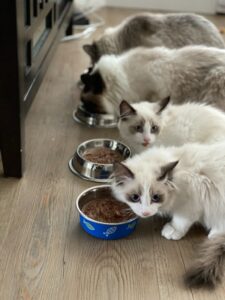Lauren Quinn reports Milk prebiotics are the cat’s meow, research shows:
If you haven’t been the parent or caregiver of an infant in recent years, you’d be forgiven for missing the human milk oligosaccharide trend in infant formulas. These complex carbohydrate supplements mimic human breast milk and act like prebiotics, boosting beneficial microbes in babies’ guts.
Milk oligosaccharides aren’t just for humans, though; all mammals make them. And new University of Illinois research suggests milk oligosaccharides may be beneficial for cats and dogs when added to pet diets.
….
In two separate studies, both published in the Journal of Animal Science, Swanson and his colleagues determined the safety, palatability, and digestibility of GNU100 [animal milk oligosaccharide-like product] in dogs and cats.
First, in vitro laboratory tests with cellular colonies showed no toxic effects or tendencies to cause cell mutation. There was no reason to expect toxicity, but the result satisfies one of the basic FDA requirements for inclusion of any new ingredient in pet foods.
Next, the researchers mixed GNU100 at 1% with a fat source and coated commercial dry diets for cats or dogs. As a control, fat-coated diets without GNU100 were also offered. When animals got to choose between the control and 1% bowls, they went crazy for the GNU100.
“In the cats, it was a huge preference. They ate nearly 18 times more food with GNU100 than the control food. We had just been hoping they wouldn’t reject it. You know, cats can be pretty finicky,” Swanson says. “When we got the data back it was like, wow, they really love that stuff! And the dogs did, too.”

